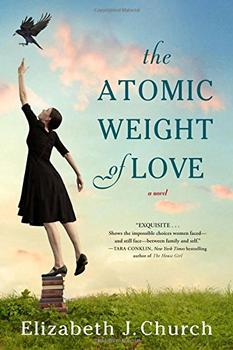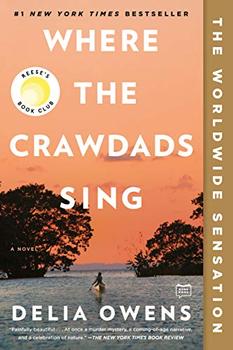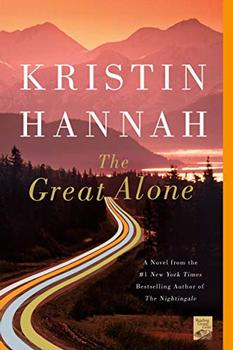Summary | Excerpt | Reading Guide | Discuss | Reviews | Beyond the book | Read-Alikes | Genres & Themes | Author Bio

A prologue set in 2011 introduces readers to this novel's unforgettable narrator. Meridian Wallace, nicknamed Meri, is an 87-year-old amateur ornithologist whose husband, Alden, was one of the (fictional) creators of the atomic bomb. As Meri looks back over her life, several common strands emerge: a lifelong love of birds, the difficulty of a woman choosing her own path and making it fit into men's plans, and the ongoing search for love, which, as the title suggests, can be a burden but also a thing of reassuring substance.
Meri grows up in Greensburg, Pennsylvania. Her father encourages her interest in science, giving her a bird book and Darwin's On the Origin of Species for birthdays. Proud of his Scottish heritage, he calls his daughter his "wee brown sparrow." His death when Meri is 11 is a terrible blow, but she determines to make him proud by throwing herself into her studies. In the 1940s she studies biology at the University of Chicago. Here she is drawn to Alden Whetstone, a physics professor 20 years her senior who lectures on the biology of flight when he isn't working on hush-hush war projects.
"My plumage was not the kind that would attract a mate, that would let me stand out from the rest of the flock," Meri recalls. And yet she draws two beaux: Jerry, a classmate who excites her physically; and Alden, who excites her intellectually. When Jerry goes off to war, the choice is made for her. She accepts Alden's marriage proposal and he leaves for top-secret government work at Los Alamos. Meri intends to undertake graduate studies at Cornell to research crow behavior (see 'Beyond the Book'), but Alden wants her to move out to New Mexico for a trial year, and then a health crisis forces her to defer Cornell yet again.
Soon it becomes clear that Meri's dream of a PhD is not to be, and she also realizes that she doesn't want children. It's a struggle for her to know how to define herself: not by a family, as older generations might have; and not by a career, as up-and-coming liberated women would. She has to find things to fill her days: volunteering, swimming, and dancing lessons, plus hiking out into the desert to monitor a crow flock three days a week. It is on one of these excursions that she meets a blond geologist and ex-Marine named Clay Griffin. Although he's only 25 and she's now 46, she feels that he truly sees and appreciates her.
This new relationship forces Meri to reassess her marriage: Were she and Alden ever really happy, or have they just been coasting along in what's easy and safe? All that resentment over having to give up her career to follow Alden's erupts in increasingly frequent marital arguments. Torn between two men who mean so much to her, Meri has to consider what her true duties are and what love really means. "There was no good solution. No clear way out, no approach that would earn the Good Housekeeping Seal of Approval," she wryly observes.
Church has a deep understanding of how marriage works: its constant sacrifices and compromises, and how much we can define ourselves by and depend on our partners. Passages recounting the everyday dilemmas and conversations of a marriage feel very true to life. This would make an excellent book club read. There is so much to think about and discuss – especially relationships, women's rights, and moral decisions.
I had a few minor problems with the novel. The pacing is uneven. The two main time periods are the 1940s and 1970, and in between the action speeds up dramatically as Church skates over the 1950s and 60s – what Meri calls "The Activity Years" of coming up with time-killing distractions. I also found the level of sexual detail a little embarrassing. What bothered me most was Meri's surprising indifference to Hiroshima; she is more disturbed by the thought of birds being instantly burned up than by human fatalities. Perhaps this is meant to show her bias; we all have our ethical blind spots, after all.
All the same, I instantly warmed to Meri as a narrator and loved following her unpredictable life story. She longs, like one of her beloved birds, to take flight into her dreams. Whether she gets there, and how, is a bittersweet journey but one you'll be glad you went along for.
![]() This review was originally published in The BookBrowse Review in May 2016, and has been updated for the
March 2017 edition.
Click here to go to this issue.
This review was originally published in The BookBrowse Review in May 2016, and has been updated for the
March 2017 edition.
Click here to go to this issue.

If you liked The Atomic Weight of Love, try these:

by Delia Owens
Published 2021
Winner of the 2018 BookBrowse Debut Author Award
How long can you protect your heart?

by Kristin Hannah
Published 2019
From the author of The Nightingale, comes a story of a family in crisis and a young girl struggling to survive at the edge of the world, in America's last true frontier.
Your guide toexceptional books
BookBrowse seeks out and recommends the best in contemporary fiction and nonfiction—books that not only engage and entertain but also deepen our understanding of ourselves and the world around us.